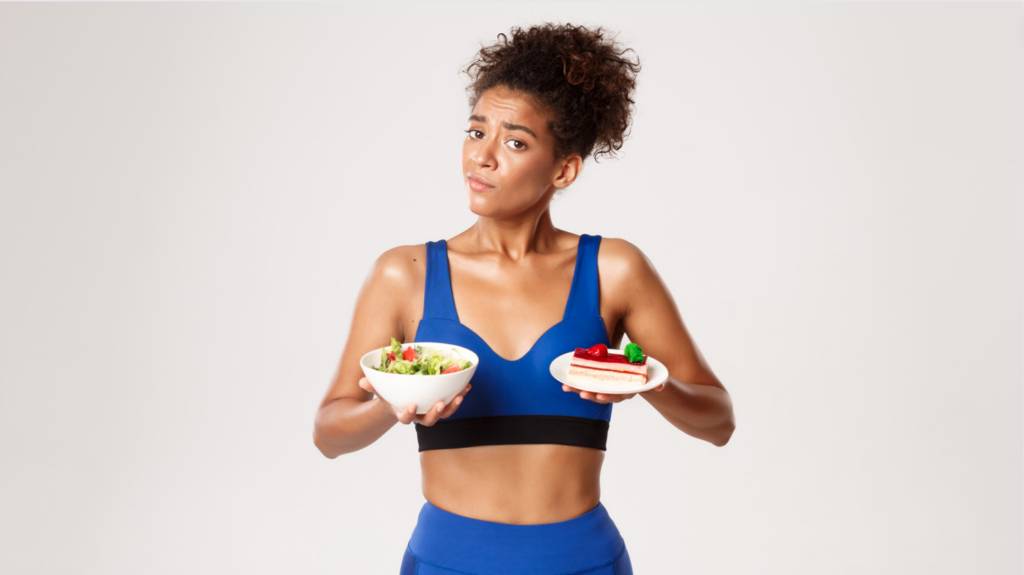Maintaining a healthy relationship with food is crucial for your overall well-being. However, this relationship can sometimes become complicated and cause stress and anxiety. If you are struggling with your relationship with food, here are some tips to help you reset and heal it.

Listen to your body
Learning to only eat when you’re actually hungry and stop when you’re full is a skillset that many of us never mastered. This means paying attention to your hunger and fullness cues.
Recognizing the difference between genuine hunger and other sensations, such as boredom or dehydration, is vital for maintaining a balanced relationship with food. It’s a common misconception to interpret the body’s signals for hydration as cues for hunger. In fact, many individuals mistakenly reach for snacks when their bodies are simply crying out for water. Boredom, too, can lead to mindless eating as a way to pass the time or seek comfort. By developing a deeper awareness of one’s body signals and regularly hydrating, individuals can make more informed choices about when and what to eat, ensuring they’re truly addressing their body’s needs.
Here are common types of hunger cues to tell when you’re hungry :
Physical Signs:
- Stomach Contractions: A growling or rumbling stomach is a common hunger cue. These sounds and feelings are caused by contractions of the stomach and intestines.
- Empty Feeling: A hollow sensation in the stomach.
- Mild Headache: Lack of nutrients can sometimes cause headaches.
- Light-headedness or Dizziness: A drop in blood sugar can cause these symptoms.
- Salivation: Increased salivation when thinking about or smelling food.
- Feeling Faint: Extreme hunger can lead to a faint feeling.
- Pale Skin: Some people might appear paler when they are hungry, due to reduced blood flow to the skin.
- Fatigue: Feeling unusually tired or low on energy can sometimes be a sign of hunger, especially if it’s been a long time since the last meal.
- Weakness: A lack of strength or stamina.
Emotional or Psychological Signs:
- Irritability or “Hangry”: A combination of hunger and anger. Some people become more irritable or short-tempered when they need to eat.
- Mood Swings: Rapid mood changes can be associated with fluctuating blood sugar levels.
- Difficulty Concentrating: Hunger can affect cognitive functions and make it hard to focus.
- Food Focus: If you’re constantly thinking about food, it might be a signal from your body that you need to eat.
Knowing when you’re FULL versus eating for pleasure or enjoyment is key to maintaining a healthy relationship with food and avoiding overconsumption. True fullness is the body’s signal that it has received the necessary nutrients and energy, whereas eating for pleasure often stems from emotional, social, or sensory motivations rather than physiological need. Over time, consistently eating beyond fullness for the sake of enjoyment can contribute to weight gain, digestive discomfort, and an imbalanced relationship with food.

Listening to our body helps us know when we’re full. It’s important to know the difference between eating because we’re hungry and eating just for fun. This way, we can eat in a healthy way, give our body what it needs, and feel good.
Here are common types of fullness cues to tell when you’re done and need to put the rest in tubber ware for later:
Physical Sensations:
- Satisfied Stomach: A comfortable feeling in your stomach, neither empty nor overly full.
- Slight Pressure: Feeling a gentle pressure in the upper stomach area.
- Reduced Flavor Intensity: The same food starts to taste blander or less enticing as you become full.
- Slower Eating: Naturally slowing down chewing, taking longer between bites.
- Putting Utensils Down: Taking breaks by setting down your fork or spoon.
- Pushing Plate Away: A subconscious act of signaling to oneself that you’ve had enough.
- Leaning Back: Leaning back in your chair can be an unconscious sign of satisfaction and fullness.
- Belching: Some people might burp when they start to feel full.
- Warmth: Feeling a warm sensation in the stomach.
- Feeling of Heaviness: A sense that you’ve consumed enough based on the perceived weight of food in your stomach.
Emotional or Psychological Signs:
- Contentment: Feeling satisfied and content, without the urge to eat more.
- Decreased Food Appeal: Food starts to look less appealing than when you began eating.
- Distraction: Your mind might start wandering from the act of eating to other subjects.
- Feeling Relaxed: Some people experience a feeling of relaxation or even slight drowsiness when they are full.
Don’t ignore your body’s signals or try to suppress them.

Avoid restrictive diets
Restrictive diets can lead to feelings of deprivation and trigger unhealthy eating patterns.
Imagine yourself as a child again. You have toy box with all kinds of different toys. What if someone told you that you could only play with one toy for the next several weeks and not the others? Would you feel sad? Would you want to play with the banned toys even more?
At our core, we are still our inner child and this is what can happen when we adopt overly restrictive diet plans. Unless you have excellent willpower, more people will benefit from learning how to eat whatever they want, just in moderation. I.e. Whatever they want, yes. However much they want, no.
Here are some tips for not restricting your meals and still being healthy with your choices:
- Think In Colors: Eat foods in a wide variety of colors and limit (not restrict or avoid) foods that aren’t colorful. Limiting non-colorful foods usually means reducing processed foods, white breads, pastas, and sugars which tend to be beige or white. If your plate is colorful with fruits, veggies, and meats, it’s more likely to be balanced. Consider yourself getting bonus points for all green food! Greens count double.
- Example: Taco Night:
- Green lettuce and avocado
- Red salsa and tomatoes
- Yellow and orange bell peppers
- Black beans or lean ground turkey for protein
- Use whole grain or corn tortillas instead of white ones
- Example: Taco Night:
- Everything in Moderation: It’s okay to have a cookie or a serving of ice cream once in a while. Especially if you’re tracking your macros/calories in an app like Carb Manager or MyFitnessPal and have the extra calories to spare anyway. But if you’re not using these free tools, know that having a small treat every once in a while when you really want it will help you stay on track for the long haul because it prevents feelings of deprivation and reduces the urge to binge or overindulge later on. By allowing yourself occasional moderate treats, you maintain a positive relationship with food and can sustain a balanced diet more easily.
- Instead of eating directly from a bag of chips, measure a single serving (or less) into a bowl and only eat that amount. You get to satisfy a craving and you’re doing so in a healthy way that still helps you reach your goals.
- Don’t Ban Foods: Let’s be honest, telling yourself you can’t have something only makes you want it more. I could personally never succeed with a plan that doesn’t allow for chocolate in my life. So instead of restricting an item that brings me joy, I would make it a reward. I know many health gurus have warned not to use food as a reward, but here me out:
- Instead of saying “I can’t have chocolate,” make it a rule that you get ONE dark chocolate truffle at the end of the day if, and only if, you hit your other meal/fitness goals that day. I.e. all your other meals were healthy/within your macros and you did your workout that was scheduled that day. This motivated me to stay on course the rest of the day knowing that I got that little truffle at the end. But this only works if you can stick the healthy serving/portion size.

Practice mindfulness
Mindful eating involves being present and engaged while eating, paying attention to the taste, texture, and aroma of food. It can help you develop a deeper appreciation and enjoyment of food and prevent overeating. For example:
- Slow Down: Take your time eating. Don’t rush.
- Try putting your fork down between bites and sipping your water
- Enjoy Each Bite: Think about how your food smells, how it tastes, and how it feels in your mouth.
- When you eat an apple, think about how crunchy it is, how sweet or tart it tastes, and the fresh smell.
- Turn Off Distractions: I was given this advice on my first visit to a weight loss doctor. When you eat, just eat. Don’t watch TV or look at your phone. When you’re distracted you’re much less likely to pick up on your full cues and continue eating well after your body is full, leading to greatly increased calorie consumption for no real reason.
- Sit at a table without any distraction when you eat. No phone, no TV, no book. Be present.
- Check-In With Your Tummy: Get in the habit of periodically asking yourself if you’re still hungry before you take another bite. Actively listening to your body in this way will help you realize which fullness cues your body prefers to communicate in,
- Imagine your stomach is a gas tank. The goal to to fill it up, but don’t overfill.
- Be Thankful: This was a concept that I learned about while living in Ireland. It’s called Food Mediation. Slow down and think about where your food came from, the process it went through from growth to your plate and be grateful for it with each bite. it naturally slows down the eating process and leaves you feeling full in more ways then one.
- Think about the farmer who grew your vegetables or the baker who made your bread. Think about that vegetable growing and being harvested and packaged. Life and energy were involved in the process and that item is now about to become a part of you.

If you find yourself engaging in negative self-talk or feeling guilty about your food choices, challenge those thoughts. Remind yourself that food is fuel, it’s how you get the energy you need to do everything you need to that day. It’s okay to enjoy all types of food in moderation. Self-inflicted guilt will not help you reach your goals and it’s not how you’re going to get a healthy grasp with food. In fact, it’s more likely to derail you because if you’re practicing negative self talk on this topic, you’re probably practicing it in other areas of your life too. If you’re being torn down constantly, by yourself or any one else, it’s defeating. It’s not certainly not motivating. So here are other you can start doing to become your biggest cheerleader and that can actually help you reach your goals instead:
- Speak Kindly & Stay Positive: If you say something mean or negative to yourself about food, try to say something nice or positive after… at least until you get out of the negative self talk habit. Make this a common practice and eventually you’ll be replacing negative thoughts with positive ones. Learn to give yourself grace.
- Change “I always mess up my diet” to “I make healthy choices most of the time and it’s okay to treat myself sometimes.”
- Food is Not Good or Bad: Every food can be part of our meals. Just eat them in the right amounts. High sugar foods are not bad, we just don’t need as much of them. Our body needs leafy greens and high fiber/high protein foods for optimal efficiency and health. I.e. We need to eat more of those. Neither are good. Neither are bad. Our habits around these foods is what is either good or bad.
- If you like cookies, like 99% of us do, there’s nothing wrong with having one or two every once in a while. However tackling an entire box of cookies in one go is going to have negative impacts since you’re not getting the nutrients your body needs and are filling up on what your body doesn’t require much of instead. This is what leads many people to having diabetes. Well, maybe not a whole box of cookies at once, but over indulging on high sugary foods in leu of the highly nutritional option your body actually needs will force your body to respond. Make good choices.
- Ask Yourself: If a friend ate the same thing, would you say mean things to them? Treat yourself as kindly as you treat your friend. If you wouldn’t say it to a friend, don’t say it to yourself.
- Think about a negative thought you’ve had about food or your eating habits? Maybe “I shouldn’t have had that slice of cake. I’m failing this whole healthy eating thing…why don’t I have discipline.”. Now, think about your favorite person on the planet. This could be your best friend, spouse, child, completely your call. Now, give yourself just as much grace and positive advice/feedback as you would if that person were sharing that same negative thought you had towards yourself , only they are sharing it with you about themselves. “Mom, I shouldn’t have had that slice of cake. I’m failing this whole healthy eating thing…why don’t I have discipline.” What would you say to your favorite human? You’d probably say something like, “It was one slice of cake and you enjoyed it. Life is about balance and moderation. You’ve been doing a great job! This is not a big deal. Especially since you still have the space in your macros this week. What can I do to help you stay on track?” Try having these kinds of responses for yourself now instead.
Remember that healing your relationship with food is a process and it takes time. Be patient with yourself and seek support from a therapist or registered dietitian if needed. With time and practice, you can develop a healthy and positive relationship with food.

